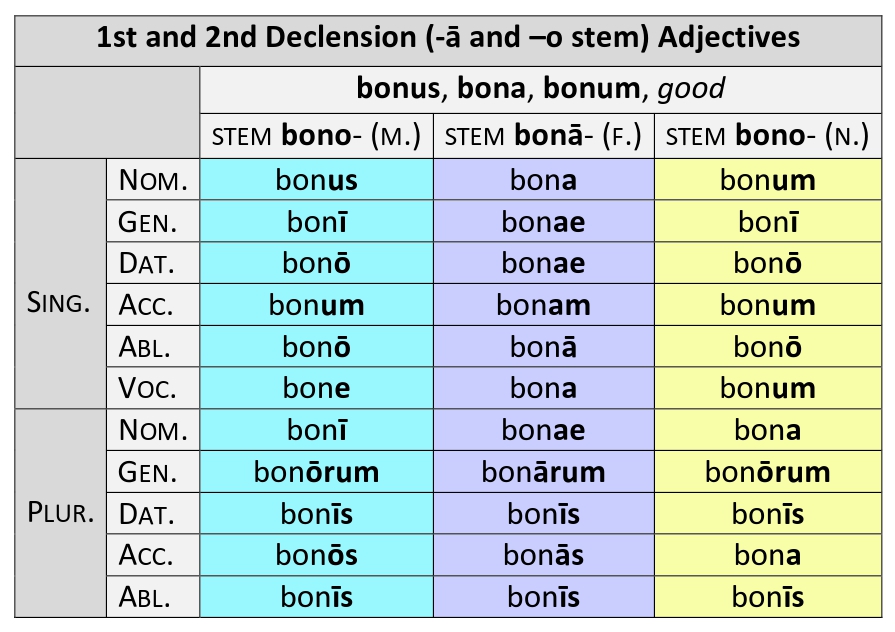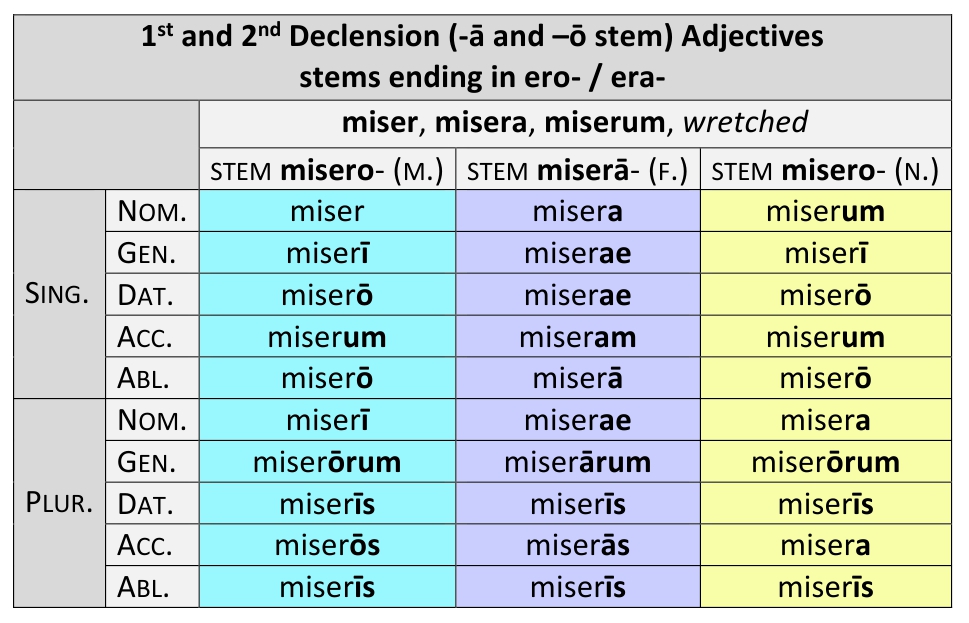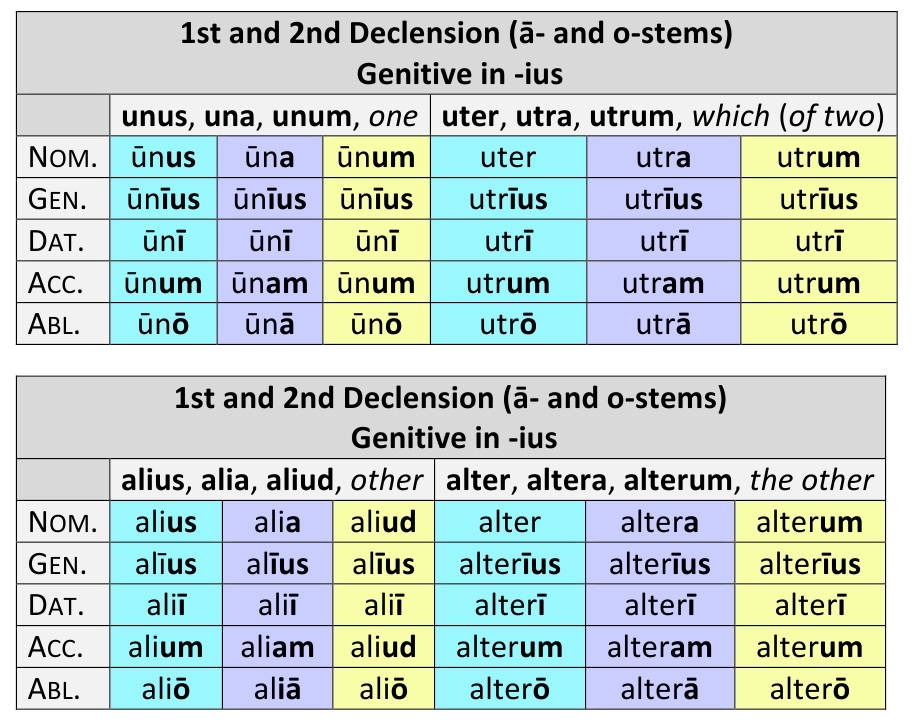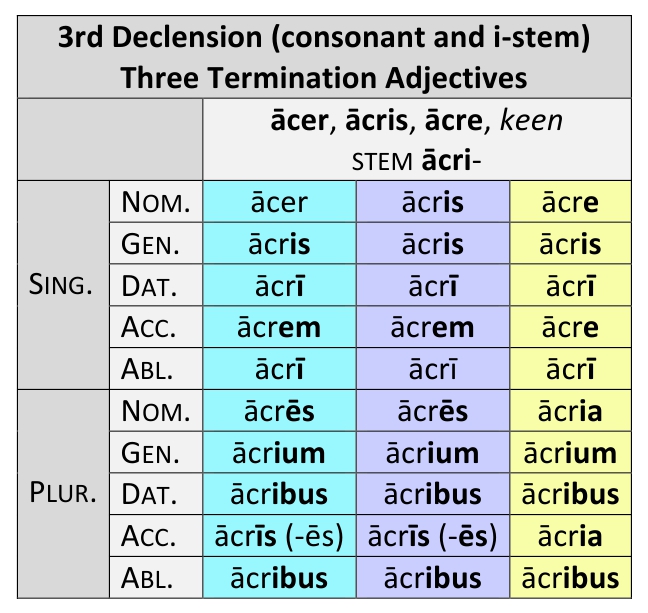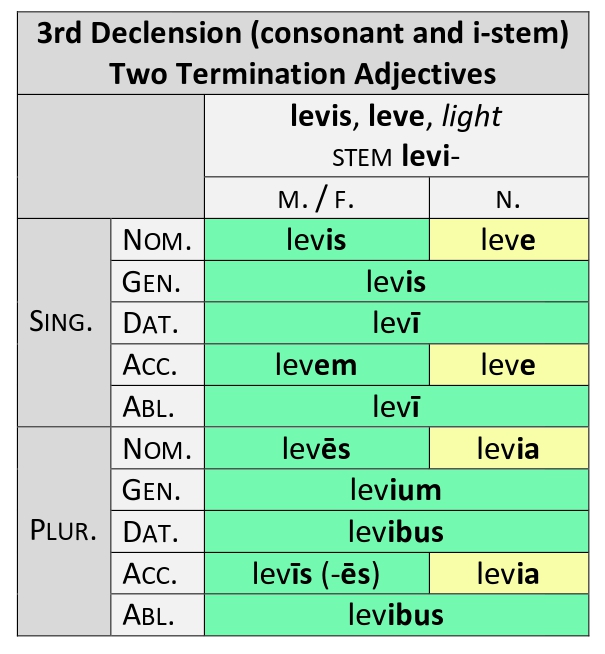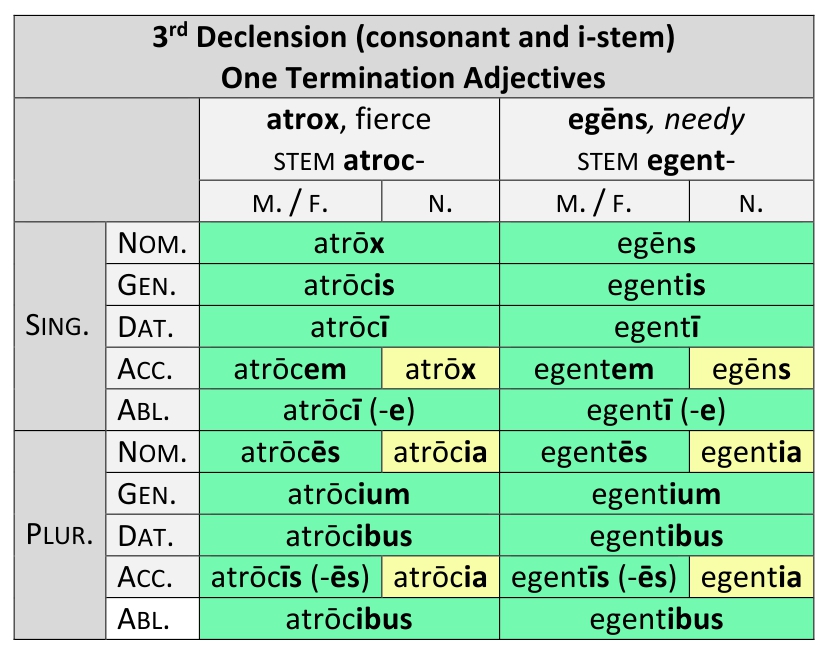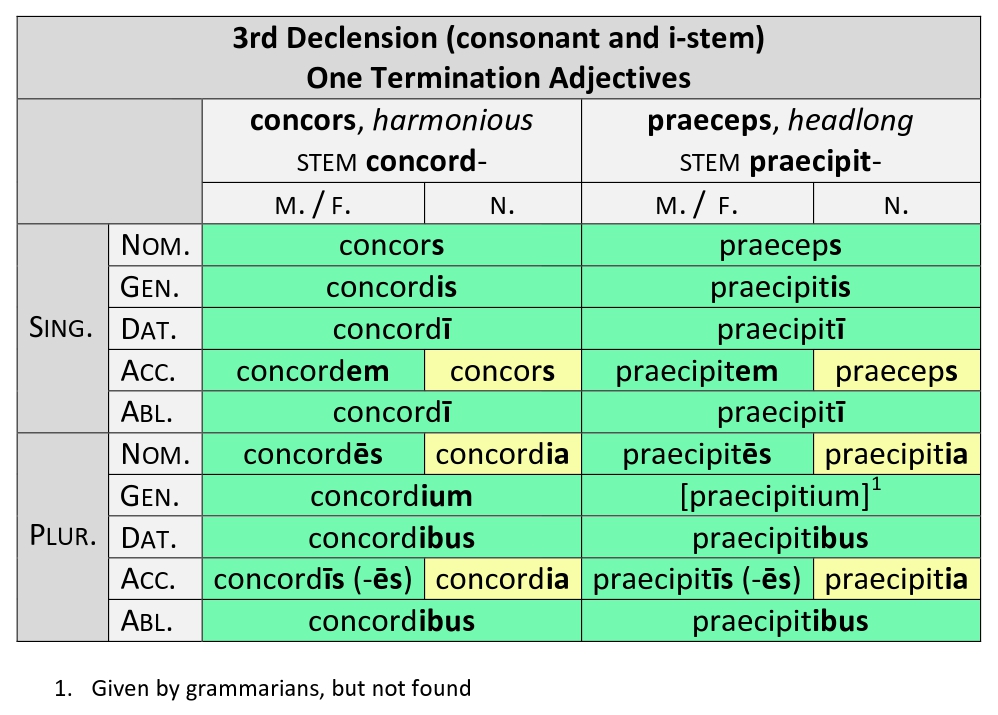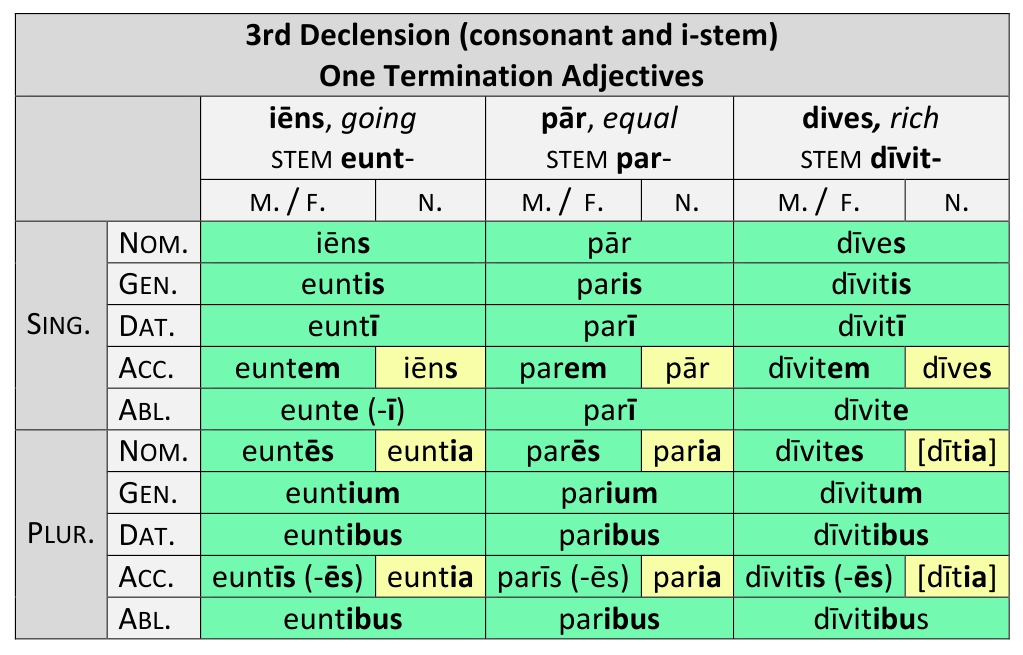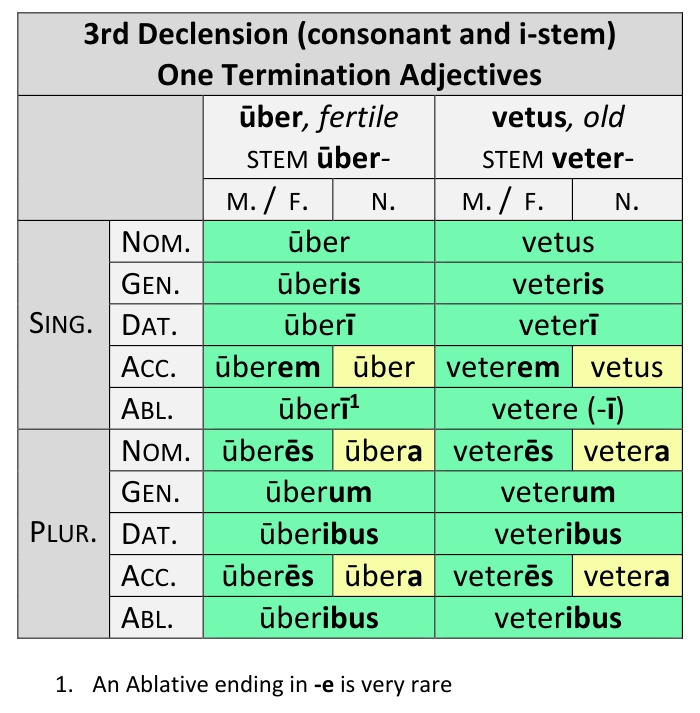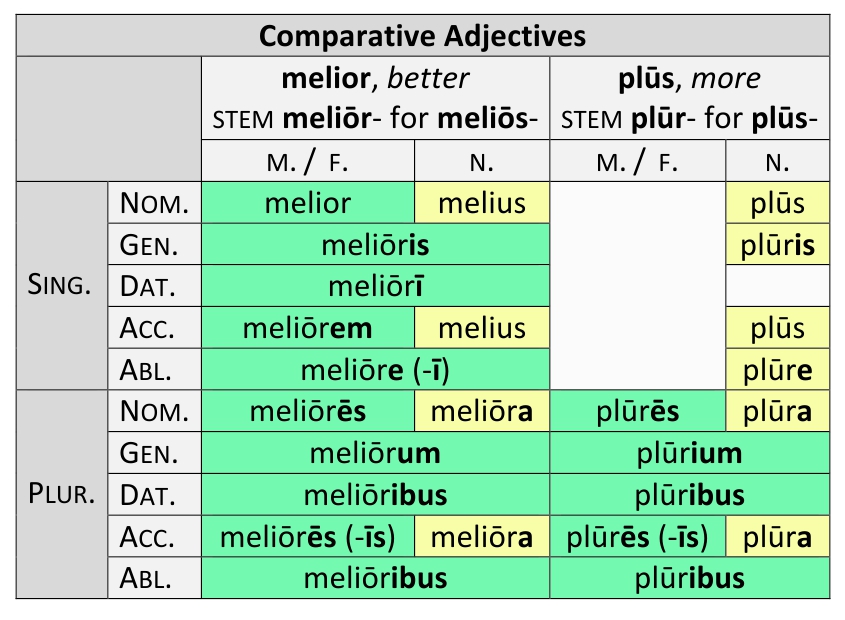ADJECTIVE DECLENSIONS
FORMATION OF ADJECTIVES
109. Adjectives and Participles are in general formed and declined like Nouns, differing from them only in their use.
- In accordance with their use, they distinguish gender by different forms in the same word, and agree with their nouns in gender, number, and case.
bonus puer the good boy
bona puella the good girl
bonum dōnum the good gift - In their inflection they are either (1) of the 1st and 2nd Declensions, or (2) of the 3rd Declension.
1ST AND 2ND DECLENSION ADJECTIVES: Ā- & O- STEMS
110. Adjectives of the 1st and 2nd Declensions (ā- and o- stems) are declined in the masculine like servus, puer, or ager; in the feminine like stella; and in the neuter like bellum.
The regular type of an adjective of the 1st and 2nd Declensions is bonus, -a, -um, which is declined below:
Note— Stems in quo- have nominative -cus (-quos), -qua, -cum (-quom), accusative -cum (-quom), -quam, -cum (-quom), to avoid quu- (see § 6.b and § 46, Note 2).
| NOM. provinces (-quos) | propinqua | propincum (-quom) |
| GEN. propinquī | propinquae | propinquī, etc. |
But most modern editions disregard this principle.
a. The Genitive Singular masculine of adjectives in -ius ends in -iī, and the Vocative in -ie; not in -ī, as in nouns (cf. § 49. b-c).
Lacedaemonius, -iī, -ie
Note— meus (my) has the vocative masculine mī (cf. § 145).
1ST AND 2ND DECLENSION ADJECTIVES: STEMS ENDING IN -RO
111. Stems ending in ro- preceded by e form the Nominative masculine like puer (§ 47) and are declined as follows.
a. The following are declined like miser:
Asper, gibber, lacer, liber, prosper (also prosperus), satur (-ura, -urum), tener
with compounds of -fer and -ger:
saetiger, -era, -erum bristle-bearing
also, ususally, dexter. In these the e belongs to the stem; but in dextra it is often omitted: dextra manus the right hand.
Note— Stems in ēro- (as prōcērus), with mōrigĕrus, propĕrus, have the regular nominative masculine in -us
b. The following lack a nominative singular masculine in the classic use.
cetera, infers, posters, super
They are rarely found in the singular except in certain phrases.
poster die the next day
Note— An Ablative feminine in -ō is found in a few Greek adjectives: lectīcā octōphorō (Verr. 5.27)
112. Stems in ro- preceded by a consonant form the nominative masculine like ager (§ 47) and are declined as follows.
a. The following ar declined like niger:
aeger, āter, crēber, faber, glaber, integer, lūdicer, macer, piger, pulcher, ruber, sacer, scaber, sinister, taeter, vafer
also the possesives, noster, vester (§ 145).
1ST AND 2ND DECLENSION ADJECTIVES: GENITIVE IN -ĪUS, DATIVE IN -Ī
113. The following nine adjectives with their compounds have the Genitive Singular in -īus and the Dative in -ī in all genders.
| alius [aliud (n.)] other | tōtus whole | alter, -terīus the other |
| nūllus no, none | ūllus any | neuter, -trīus neither |
| sōlus alone | ūnus one | uter, -trīus which (of two) |
Of these, the singular is thus declined.
a. The plural of these words is regular, like that of bonus (§ 110).
b. The genitive in -īus, dative in -ī, and neuter in -d are pronominal in origin (cf. illīus, illī, illud, and § 146).
c. The i of the genitive ending -īus, though originally long, may be made short in verse; this occurs often in alterius and regularly in utriusque.
d. Instead of alīus, alterīus is commonly used, or in the possessive sense the adjective aliēnus, belonging to another, another's.
e. In compounds—such as alteruter—sometimes both parts are declined, sometimes only the latter. Thus, alterī utrī or alterutrī, to one of the two.
Note— The regular genitive and dative forms (as in bonus) are sometimes found in some of these words.
gen. and dat.( f.) aliae
dat. (m.) aliō
Rare forms are alis and alid (for alius, aliud).
3RD DECLENSION ADJECTIVES: CLASSIFICATION AND PARADIGMS
114. Adjectives of the 3rd Declension are classified in this manner:
- Adjectives of Three Terminations in the nominative singular (one for each gender).
ācer, ācris, ācre
- Adjectives of Two Terminations (masculine and feminine the same).
levis (m. / f.), leve (n.)
- Adjectives of One Termination (the same for all three genders).
atrōx
a. Adjectives of two and three terminations are true i-stems and hence retain -ī in the ablative singular, -ia in the neuter plural, -ium in the genitive plural, and in the accusative plural regularly -īs (see §§ 73-74).1
115. Adjectives of Three Terminations are declined as follows.
a. The following stems in ri- are declined like ācer.
placer, campester, celeber, sequester, palūster, pedester, puter, salūber, silvester, terrester, volucer
So also names of months in -ber.
Octōber (cf. § 66)
Note 1— This formation is comparatively late, therefore, in the poets and in early Latin, either the masculine or the feminine form of these adjectives was sometimes used for both genders.
coetus alacris (Enn.)
In others, there is no separate masculine form at all, and these are declined like levis (see § 116 below).
faenebris, fūnebris, illūstris, lūgubris, mediocris, muliebris
Note 2— Celer, celeris, celere, swift, has the genitive plural celerum, used only as a noun, denoting a military rank. The proper name Celer has the ablative in -e.
116. Adjectives of Two Terminations are declined as follows.
Note— Adjectives of two and three terminations sometimes have an ablative in -e in poetry, rarely in prose.
117. The remaining adjectives of the 3rd declension are Consonant stems; but most of them, except Comparatives, have the following forms of i-stems:2
- -ī in the ablative singular (but often -e).
- -ia in the nominative and accusative plural neuter.
- -ium in the genitive plural.
- -īs (as well as -ēs) in the accusative plural masculine and feminine.
In the other cases they follow the rule for Consonant stems.
a. These adjectives, except stems in l- or r-, form the nominative singular from the stem by adding s.
atrōx (stem atrōc- + s)
egēns (stem egent- + s)3
b. Here belong the present participles in -ns (stem nt-).3
amāns, monēns
They are declined like egēns (but cf. § 121).
118. Adjectives of one termination are declined as follows.
119. Other examples are the following.
Note— Of these vetus is originally an s-stem. In most s-stems the r has intruded itself into the nominative also.
bi-corpor (for † bi-corps)
dēgener (for † dē-genes)
Footnotes
DECLENSION OF COMPARATIVES
120. Comparatives are declined as follows.
a. All comparatives except plūs are declined like melior.
b. The stem of comparatives properly ended in ŏs-, but this became or- in the nominative masculine and feminine, and ōr- in all other cases except the nominative and accusative singular neuter, where s is retained and ŏ is changed to ŭ (cf. honŏr, -ōris; corpus, -ŏris). Thus comparatives appear to have two terminations.
c. The neuter singular plūs is used only as a noun. The genitive (rarely the ablative) is used only as an expression of value (cf. § 417). The dative is not found in classic use. The compound complūrēs, several, has sometimes neuter plural complūria.
3RD DECLENSION ADJECTIVES: CASE FORMS OF CONSONANT STEMS
121. In adjectives of Consonant stems—
a. The Ablative Singular commonly ends in -ī, but sometimes -e.
- Adjectives used as nouns (superstes survivor) have -e.
- Participles in -ns used as such (especially in the Ablative Absolute, § 419), or as nouns,
regularly have -e; but participles used as adjectives have regularly -ī.
dominō imperante at the master's command
ab amante by a lover
ab amanti muliere by a loving woman - The following regularly have -ī.
āmēns, anceps, concord (and other compounds of cor), cōnsors (but as a substantive, -e), dēgener, hebes, ingēns, inops, memor (and compounds), pār (in prose), perpes, praeceps, praepes, teres
- The following regularly have -e.
caeles, combos, [† dēses], dīves, hospes, particeps, pauper, prīnceps, sōspes, superstes
So also patrials (see § 71.5) and stems in āt-, īt-, nt-, rt-, when used as nouns, and sometimes when used as adjectives.
b. The Genitive Plural ends commonly in -ium, but has -um in the following:1
- Always in combos, dīves, inops, particeps, praepes, prīnceps, supplex, and compounds of nouns which have -um (quadru-pēs, bi-color).
- Sometimes, in poetry, in participles in -ns: silentum concilium a council of the silent shades (Aen. 6.432).
c. The Accusative Plural regularly ends in -īs, but comparatives commonly have -ēs.
d. Vetus (gen. -ĕris) and pūbes (gen. -ĕris) regularly have -e in the ablative singular, -a in the nominative and accusative plural, and -um in the genitive plural. For ūber, see § 119.
e. A few adjectives of one termination, used as nouns, have a feminine form in -a (clienta, hospita) with the appellative Iūnō Sōspita.
Footnotes
IRREGULARITIES AND SPECIAL USE OF ADJECTIVES
122. The following special points require notice.
a. Several adjectives vary in declension.
gracilis (-us)
hilaris (-us)
inermis (-us)
bicolor (-ōrus)
b. A few adjectives are indeclinable.
damnās
frūgī (Dative of Service,
see § 382.1, Note 2)
nēquam (originally an adverb)
necesse
tot, quot, aliquot, totidem
(pronominal forms)
Potis is often used as an indeclinable adjective, but sometimes has pote in the neuter.
c. Several adjectives are defective.
.exspēs [only
nominative]
exlēx (exlēgem) [only nominative and accusative singular]
pernox (pernocte) [only nominative and ablative singular]
prīmōris, sēminecī, etc., [lack the nominative singular]
d. Many adjectives, from their signification, can be used only in the masculine and feminine. These may be called adjectives of common gender.
adulēscēns youthful
[† dēses], -idis slothful
inops, -opis poor
sōspe, -itis safe
Similarly, senex (old man) and iuvenis (young man) are sometimes called masculine adjectives.
For Adjectives used as Nouns, see §§ 288 - 289; for Nouns used as Adjectives, see § 321.c; for Adjectives used as Adverbs, see § 214; for Adverbs used as Adjectives, see § 321.d.
COMPARISON OF ADJECTIVES
123. In Latin, as in English, there are three degrees of comparison: the Positive, the Comparative, and the Superlative.
124. The Comparative is regularly formed by adding -ior (neuter -ius),1 the Superlative by adding -issimus (-a, -um), to the stem of the Positive, which loses its final vowel.
Note— A form of diminutive is made upon the stem of some comparatives.
grandius-culus a little larger (see § 243).
a. Participles when used as adjectives are regularly compared.
patiēns (patient), patientior, patientissimus
apertus (open), apertior, apertissimus
125. Adjectives in -er form the Superlative by adding -rimus to the Nominative. The comparative is regular.
ācer (keen), ācrior, ācerrimus
miser (wretched), miserior,
miserrimus
a. So vetus (gen. veteris) has superlative veterrimus, from the old form veter and mātūrus, besides its regular superlative (mātūrissimus), has a rare form mātūrrimus.
For the comparative of vetus, vetustior (from vetustus) is used.
126. Six adjectives in -lis form the superlative by adding -limus to the stem clipped of its final -i-. These are facilis, difficilis, similis, dissimilis, gracilis, humilis.
facilis (easy), facilior, facillimus [stem facili-]
127. Compounds in -dicus (saying) and -volus (willing) take in their comparison the forms of the corresponding participles dīcēns and volēns, which were anciently used as adjectives.
maledicus (slanderous), maledīcentior, maledīcentissimus
malevolus (spiteful), malevolentior, malevolentissimus
a. So, by analogy, compounds in -ficus.
māgnificus (grand), māgnificentior, māgnificentissimus
128. Some adjectives are compared by means of the adverbs magis (more) and maximē (most). So especially adjectives in -us preceded by e or i.
idōneus (fit), magis idōneus, maximē idōneus.
Note— But pius has piissimus in the superlative, a form condemned by Cicero, but common in inscriptions; equally common, however, is the irregular pientissimus.
Footnotes
IRREGULAR AND DEFECTIVE COMPARISON OF ADJECTIVES
129. Several adjectives have in their comparison irregular forms.
| bonus good | melior better | optimus best |
| malus bad | pêior worse | pessimus worst |
| māgnus great | mâior greater | maximus greatest |
| parvus small | minor less | minimus least |
| multus much |
plūs (n.) more |
plūrimus most |
| multī many | plūrēs more | plūrimī most |
|
nēquam worthless |
nēquior | nēquissimus |
|
frūgī useful, worthy |
frūgālior | frūgālissimu |
| dexter on the right, handy | dexterior | dextimus |
Note— These irregularities arise from the use of different stems (cf. § 127). Thus frūgālior and frūgālissimus are formed from the stem frūgāli-, but are used as the comparative and superlative of the indeclinable frūgī.
130. Some Comparatives and Superlatives appear without a Positive.
| ōcior swifter | ōcissimus swiftest |
| potior preferable1 | potissimus most important. |
a. The following are formed from stems not used as adjectives. 2
| cis, citrā on this side (adv.) |
citerior hither | citimus hithermost |
| dē down (prep.) |
dēterior worse | dēterrimus worst |
| in, intrā in, within (prep.) |
interior inner | intimus inmost |
| prae, prō before (prep.) |
prior former | prīmus first |
| prope near (adv.) |
propior nearer | proximus next |
| ultrā beyond (adv.) |
ulterior farther | ultimus farthest |
b. Of the following the positive forms are rare, except when used as nouns (generally in the plural).
| exterus outward | exterior outer | extrēmus (extimus) outmost |
| īnferus below (see § 111.b) |
īnferior lower | īnfimus (īmus) lowest |
| posterus following | posterior latter | postrēmus (postumus) last |
| superus above | superior higher | suprēmus or summus highest |
But the plurals, exterī (foreigners), īnferī (the gods below) posterī (posterity), superī (the heavenly gods), are common.
Note— The superlative postumus has the special sense of last-born, and was a well known surname.
131. Several adjectives lack the Comparative or the Superlative.
a. The Comparative is rare or wanting in the following.
| bellus | inclutus (or inclitus) | novus |
| caesius | invictus | pius |
| falsus | invītus | sacer |
| fīdus (with its compounds) | meritus | vafer |
b. Many adjectives in -ilis or -bilis lack the superlative—for example, agilis, probābilis, and the following.
| āctuōsus | exīlis | prōclīvis | surdus |
| agrestis | ingēns | propinquus | taciturnus |
| alacer | iēiūnus | satur | tempestīvus |
| arcānus | longinquus | sēgnis | teres |
| caecus | oblīquus | sērus | vīcīnus |
| diūturnus | opīmus | supīnus |
c. From iuvenis (youth) and senex (old man) [cf. § 122.d], are formed the comparatives iūnior (younger) and senior (older). For these, however, minor nātū and mâior nātū are sometimes used (nātū being often omitted). The superlative is regularly expressed by minimus and maximus, with or without nātū.
Note— In these phrases nātū is an Ablative of Specification (see § 418).
d. Many adjectives (such as aureus golden) are incapable of comparison due to their meaning.
Note— But each language has its own usage in this respect. Thus, niger (glossy black) and candidus (shining white) are compared; but not āter or albus, meaning absolute dead black or white (except that Plautus once has ātrio).
Footnotes
2. The forms in -trā and -terus were originally comparative (cf. alter), so that the comparatives in -terior are double comparatives. Īnferus and superus are comparatives of a still more primitive form (cf. the English comparative in -er). The superlatives in -timus (-tumus) are relics of old forms of comparison; those in -mus like īmus, summus, prīmus, are still more primitive. Forms like extrēmus are superlatives of a comparative. In fact, comparison has always been treated with an accumulation of endings, as children say furtherer and furtherest.
